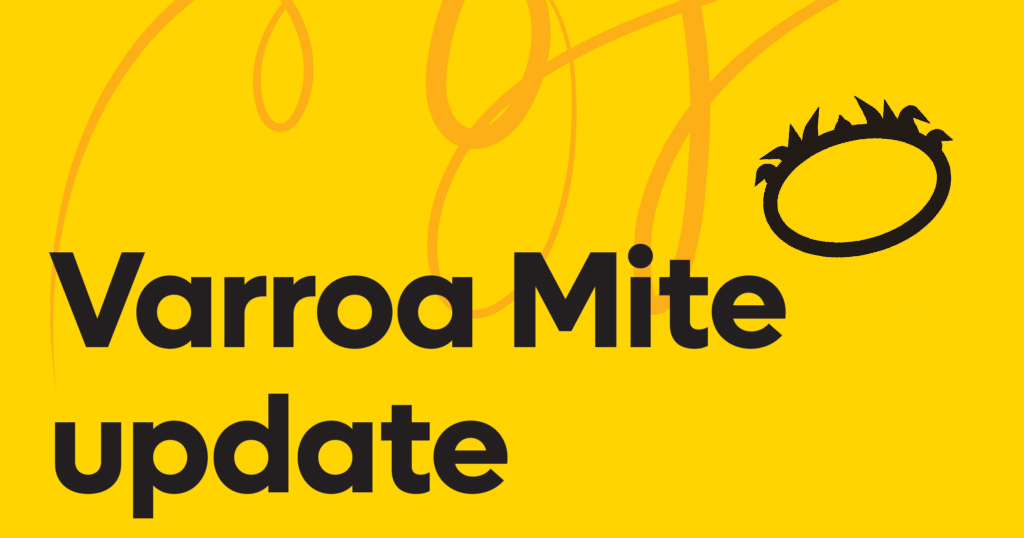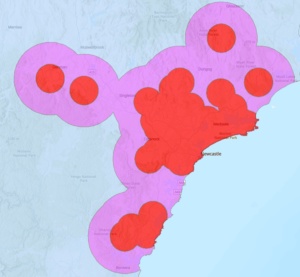Varroa Update 15 : 4 New Detections and Emergency Order No.36
31 January 2023Incursion Update 15 from the Varroa Coordinator Tuesday 31 January marks 223 days of Varroa Response. January has been a busy month and there has been tremendous dedication from the […]

Incursion Update 15 from the Varroa Coordinator
Tuesday 31 January marks 223 days of Varroa Response. January has been a busy month and there has been tremendous dedication from the DPI, all personnel involved deserve a big thank you from Industry for all their hard work so far.
Surveillance has confirmed an additional 4 Varroa mite detections, bringing the total number of infected premises to 112 with a new emergency order now in place. These detections have been linked to known cases and their finding is not unexpected. The positive results reaffirm the importance of the surveillance work being carried out by the DPI.
Two of these detections at Vacy and one at Tumbi Umbi fall within existing eradication zone while another was located in the surveillance zone at Allworth. Eradication zones will expand north and west of Vacy with a larger area to the north of Karuah.
Field crews are working out of sites at Grafton, Tocal and Ourimbah while several staff continue to support the response through laboratories and management at other locations throughout the blue zone. The coordinated surveillance over the last week with miticide strips and sticky mat has been completed on 988 hives in both purple and blue zones. These figures are based on surveillance occurring and a result confirmed through the laboratory. Night crews in the last week euthanised 110 hives, of the red zone’s from detections late last year, with the aim to complete the challenging work in these zones by end of February.
The wild European honey bee baiting team has established an additional 13 feeder stations across the six zones, which have also included 7 successful Fipronil applications for Jerrys Plains, Nana Glen and Newcastle.
Across other sections of the program team in the past week, the Department has assisted with an additional 19 movement permits and progressed 88 beekeeper reimbursement applications.
To ensure we have the best possible chance of eradication AHBIC reminds beekeepers that they still need to follow all the requirements set out in the Emergency Order. This includes reporting your 16 week alcohol washes to the Department upon completion and to submit movement permit requests in both purple and blue zones.

UPDATED Emergency Order No.36
Hive movements and permits
Surveillance action definition has been amended to include an authorised officer inserting miticide strips into a hive, this will enable DPI surveillance in the previous 16 weeks to count towards existing reporting requirements and also count towards surveillance activities when making declarations for hive movement permits.
Empty honey supers have been described in greater detail making the treatment requirements for empty honey supers/stickies clearly defined post extraction as requiring to be kept either:
- in an enclosed, bee-proof space, for 21 days, or
- in cold storage at -15 degrees Celsius or colder, for 72 hours,
All beekeepers are reminded to apply through the DPI for permits if removing honey supers and intending to cross through different zones.
Chemical Treatments
An addition has been made which stipulates a person must not apply a chemical treatment to a hive for the purpose of controlling or suppressing Varroa mite. In Australia, there are no veterinary medicines approved for this purpose and AHBIC warns of significant health risks to both humans and honeybees, associated with any non-approved chemical in or around bee hives.
Splitting Hives, Raising Queens and Feeding Bees
PURPLE zone registered beekeepers are permitted to split hives and raise queens but only within a single premise. Beekeepers can also feed bees using a permitted bee feeder, that is only accessible to bees from inside the hive, no open feeding.
BLUE zone registered beekeepers are permitted to split hives and raise queens movement permits are still required to move between premises. Beekeepers can also feed bees using a permitted bee feeder, that is only accessible to bees from inside the hive, no open feeding.
